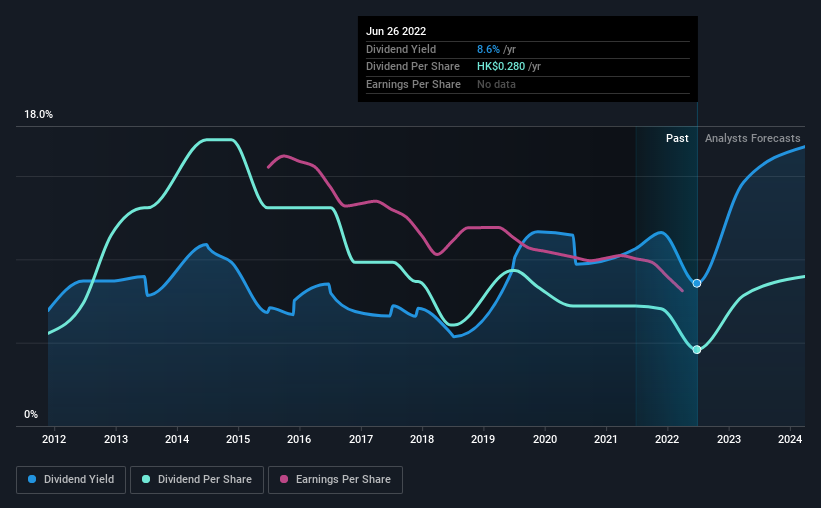Pacific Textiles Holdings' (HKG:1382) Dividend Will Be Reduced To HK$0.14
Pacific Textiles Holdings Limited (HKG:1382) is reducing its dividend to HK$0.14 on the 1st of September. However, the dividend yield of 11% is still a decent boost to shareholder returns.
View our latest analysis for Pacific Textiles Holdings
Pacific Textiles Holdings' Payment Has Solid Earnings Coverage
We like to see robust dividend yields, but that doesn't matter if the payment isn't sustainable. Before making this announcement, Pacific Textiles Holdings was paying out quite a large proportion of both earnings and cash flow, with the dividend being 162% of cash flows. Paying out such a high proportion of cash flows can expose the business to needing to cut the dividend if the business runs into some challenges.
The next year is set to see EPS grow by 36.9%. Under the assumption that the dividend will continue along recent trends, we think the payout ratio could be 56% which would be quite comfortable going to take the dividend forward.

Dividend Volatility
The company's dividend history has been marked by instability, with at least 1 cut in the last 10 years. The dividend has gone from HK$0.34 in 2012 to the most recent annual payment of HK$0.28. The dividend has shrunk at around 1.9% a year during that period. Generally, we don't like to see a dividend that has been declining over time as this can degrade shareholders' returns and indicate that the company may be running into problems.
Dividend Growth May Be Hard To Come By
Growing earnings per share could be a mitigating factor when considering the past fluctuations in the dividend. Pacific Textiles Holdings has seen earnings per share falling at 9.7% per year over the last five years. Declining earnings will inevitably lead to the company paying a lower dividend in line with lower profits. Earnings are forecast to grow over the next 12 months and if that happens we could still be a little bit cautious until it becomes a pattern.
The Dividend Could Prove To Be Unreliable
Overall, it's not great to see that the dividend has been cut, but this might be explained by the payments being a bit high previously. The track record isn't great, and the payments are a bit high to be considered sustainable. We don't think Pacific Textiles Holdings is a great stock to add to your portfolio if income is your focus.
It's important to note that companies having a consistent dividend policy will generate greater investor confidence than those having an erratic one. Still, investors need to consider a host of other factors, apart from dividend payments, when analysing a company. As an example, we've identified 1 warning sign for Pacific Textiles Holdings that you should be aware of before investing. If you are a dividend investor, you might also want to look at our curated list of high yield dividend stocks.
New: Manage All Your Stock Portfolios in One Place
We've created the ultimate portfolio companion for stock investors, and it's free.
• Connect an unlimited number of Portfolios and see your total in one currency
• Be alerted to new Warning Signs or Risks via email or mobile
• Track the Fair Value of your stocks
Have feedback on this article? Concerned about the content? Get in touch with us directly. Alternatively, email editorial-team (at) simplywallst.com.
This article by Simply Wall St is general in nature. We provide commentary based on historical data and analyst forecasts only using an unbiased methodology and our articles are not intended to be financial advice. It does not constitute a recommendation to buy or sell any stock, and does not take account of your objectives, or your financial situation. We aim to bring you long-term focused analysis driven by fundamental data. Note that our analysis may not factor in the latest price-sensitive company announcements or qualitative material. Simply Wall St has no position in any stocks mentioned.
About SEHK:1382
Pacific Textiles Holdings
Manufactures and trades in textile products in the People’s Republic of China, Vietnam, Indonesia, Bangladesh, Cambodia, Sri Lanka, Jordan, Africa, Hong Kong, India, the United States, Haiti, other Asian countries, and internationally.
Excellent balance sheet and slightly overvalued.
Market Insights
Community Narratives


Recently Updated Narratives


MINISO's fair value is projected at 26.69 with an anticipated PE ratio shift of 20x


The Quiet Giant That Became AI’s Power Grid


Nova Ljubljanska Banka d.d will expect a 11.2% revenue boost driving future growth
Popular Narratives


The company that turned a verb into a global necessity and basically runs the modern internet, digital ads, smartphones, maps, and AI.


MicroVision will explode future revenue by 380.37% with a vision towards success



